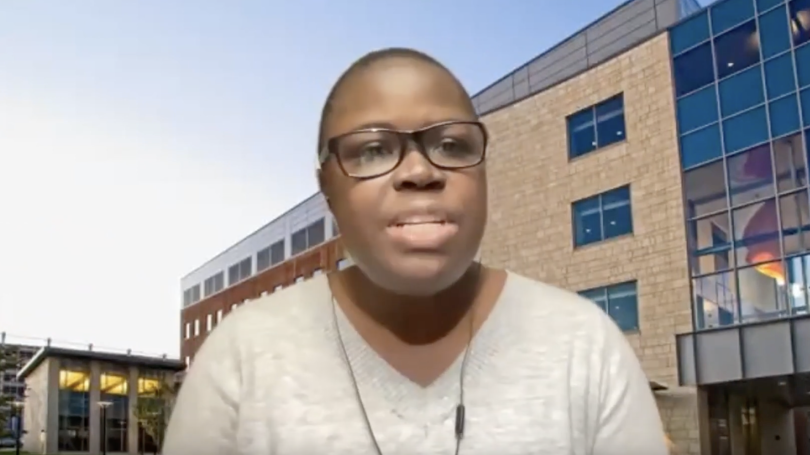
On January 12th, Kimberly Mutcherson, Co-Dean and Professor of Law at Rutgers Law School, and Mary Ziegler, Stearns Weaver Miller Professor at Florida State University College, convened with students and community members.
On Wednesday, January 12th, 2022, Kimberly Mutcherson, Co-Dean and Professor of Law at Rutgers Law School, and Mary Ziegler, Stearns Weaver Miller Professor at Florida State University College, convened with Dartmouth students and community members for the Rockefeller Center's first event of the winter term. The event was co-sponsored by Dartmouth Women in Law and Politics and The Rockefeller Center.
Wednesday's panel discussed the future of reproductive rights in the United States in the context of legal challenges to abortion access across the country. Julie Kailish, a Lecturer at Dartmouth's Institute for Writing and Rhetoric, served as moderator.
With the Supreme Court having moved rightward on reproductive issues following three Supreme Court appointments by the Trump Administration, the Court appears increasingly likely to rule in favor of legislation that restricts access to abortion.
For instance, Mississippi passed the Gestational Age Act in 2018, which bans most abortions after 15 weeks of pregnancy. Lower courts had ruled in a preliminary injunction to prevent enforcement of this law because it violated Planned Parenthood v. Casey—a landmark Supreme Court ruling upholding the constitutional right to abortion established in Roe v. Wade and restricting legislation that imposes an "undue burden" on a woman seeking abortion.
The Supreme Courts heard oral arguments pertaining to the case, Dobbs v. Jackson Women's Health Organization, in December 2021. A decision on the case, which is expected this summer, could overturn Planned Parenthood v. Casey and Roe v. Wade. In short, the panelists' visit to the Rockefeller Center was well-timed.
The panelists began by offering their thoughts on the current state of abortion rights in the United States. Professor Ziegler noted that although a constitutional right to abortion remains in place, abortion access across states is already highly unequal. For instance, "if you are a low-income person of color living in Alabama, your ability to exercise your right to choose abortion is completely different than what it would be in Los Angeles." Similarly, Professor Mutcherson argued that "the truth of the matter is that we've really been living in a post-Roe America for a while," observing that Planned Parenthood v. Casey—while it upheld Roe v. Wade—opened the door to restrictions on abortion that did not meet the "undue burden" requirement.
Mutcherson and Ziegler then considered what might happen to abortion access across the United States if the Supreme Court elected to overturn Roe v. Wade. Ziegler predicted that with states free to restrict abortion under this scenario, entire regions could lose access to abortion clinics. Ziegler also discussed how new abortion restrictions could penalize those providing and receiving abortions. While legal restrictions would likely initially target abortion providers, people receiving abortions may also be held legally accountable to limit self-managed abortions. "Practically, [states are] going to need to," Ziegler said of implementing punitive measures against women seeking abortion.
Building on this point, Mutcherson said "I don't think that this is just going to stop at abortion," expressing concern that abortion restrictions could be a gateway to limiting contraceptive access.
Ziegler echoed this point, saying that in conversations with pro-life activists from Texas she found that "fertility clinics are 100 percent on the table" if Roe collapses. "My sense in studying this is that we have no idea how far this is going to go," Ziegler warned.
More broadly, Mutcherson critiqued the mentality that "women, particularly white women, have to carry their pregnancy to term," arguing that current measures to restrict abortion access are grounded in a dark history of American racism preventing "the 'wrong' people [from] having babies." To prevent reproductive rights from further eroding, Mutcherson argued that people needed to vote, and that voting access needed to be expanded. "If you care about abortion rights, you care about voting rights," Mutcherson said.
In that vein, Ziegler argued that "the bet that lawmakers in the South and Midwest (those poised to restrict abortion access in the event of an overturn of Roe) are making is that there is enough negative partisanship…that even if people in those states don't like the abortion policies being introduced, that won't matter because people would never vote for a Democrat anyway." The political consequences of a widespread retreat in abortion rights remain to be seen.
What does this mean for reproductive rights in the long term? Mutcherson appealed to people to organize in opposition to impending restrictions on abortion access. Adding to this, Ziegler noted that the notion that whatever the Supreme Court says is final "has never been true and will never be true." Irrespective of Roe's fate, the battle over reproductive rights in the United States, both in the courts and in the legislatures, will continue.
Written by Ben Vagle '22, Rockefeller Center Student Assistant for Public Programs
A recording of this event is available to watch here.